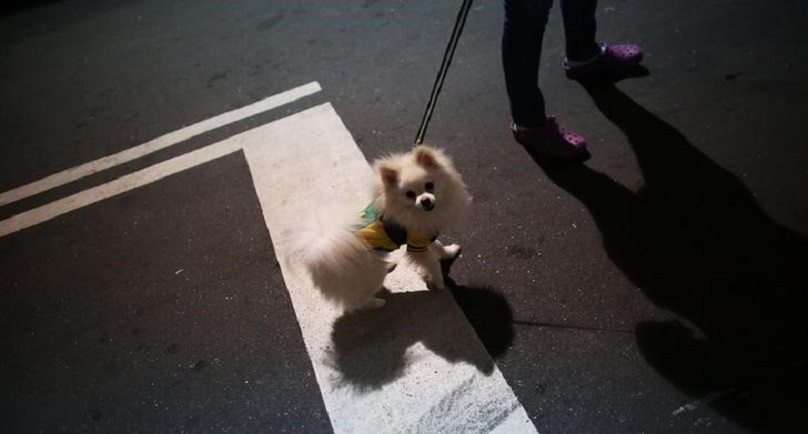Image: A dog called wears a Brazil jersey as its owner walks with it at a car park in Sao Paulo June 24, 2014. REUTERS/Nacho Doce/Files
.
By Reese Ewing
SAO PAULO (Reuters) – While Brazil’s economy is in the doghouse, one underground business is bucking the trend — dognapping.
Bosco, a black and white Boston Terrier stolen in November from outside a grocery store in Sao Paulo’s posh Jardins neighborhood, became the poster-pup for the rise of dognappings.
His owner, screenwriter Fernando Pedrosa, unleashed a storm of comment on social media sit’s Facebook, Twitter and Instagram under the tag #cadeobosco, which translates as “where is Bosco”.
Raul Rocha, one of a team of six investigators at DetetivePet in Sao Paulo that helped broker Bosco’s return, said that in the past, thieves were mostly in it for quick cash, selling the pilfered pooch at informal sidewalk fairs or to black market puppy mills.
“These days, more of our cases involve ransom,” Rocha said in his office, adding he has seen a sharp increase in stolen dogs in the past year. “Criminals are using the owner’s attachment to the dog to ensure payment.”
Pedroso declined to comment on his ordeal, saying he and Bosco wanted time to recover. But his postings have encouraged other owners to post stolen pets.
Police say there are no official figures on animal theft but detectives and local media say thieves are increasingly preying on the booming pet business.
Brazilians have more than 52 million dogs, according to the IBGE federal statistics institute — exceeding the number of children under 14 years old in Latin America’s largest economy.
About one in every four families owns at least one dog in Brazil, compared with roughly one in every three families in the United States, according to trade group Pet Brasil.
Owners are being warned by industry groups and veterinarians not to leave their dogs leashed outside of shops and to walk them in groups.
Thieves target small breeds such as Pomeranians, Pugs and Pekingese, which tend to be easier to carry off without a struggle. They also offer attractive returns on the black market.
Most thefts occur on the street and are not violent, Rocha said.
At GAMA PET, a high-end pet shop in the Shopping Cidade Jardim mall in Sao Paulo, a six-week-old French Bulldog sells for more than 7,000 reais ($1,750), the equivalent of 10 months’ salary on Brazil’s minimum wage.
Thieves would get only a fraction of this amount selling an undocumented dog on the street, pet detective Rocha said.
A local startup with private equity backing called Marq Systems will launch in April a global positioning system (GPS) and cellular-equipped device that attaches to animals’ collars and signals the owners’ smart phone its whereabouts every few minutes.
“We realized the owners needed a reliable way to locate their pets for their own comfort,” said Daniel Rosenfeld, one of the founding partners.
(Editing by Daniel Flynn and Raissa Kasolowsky)
Copyright 2015 Thomson Reuters. Click for Restrictions.


